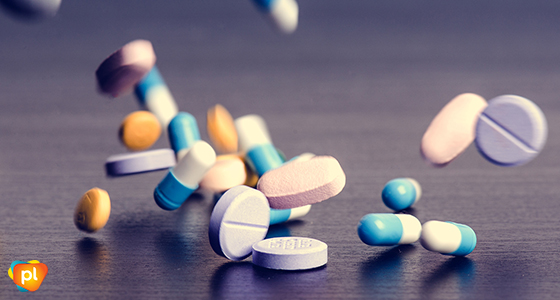
Many of us who are either recently diagnosed or living longer with HIV, are taking extra off-the-shelf medications, supplements, vitamins and minerals for a range of reasons. Which is great, ’cause we’re prioritising remaining healthy.
The question is: how does the additional medications and supplements impact on our health as people living with HIV?
Many people living with HIV are taking as many as five or more medications at the same time (polypharmacy) to manage extra medical conditions (comorbidities). For example, this might be someone living with HIV and high blood pressure or diabetes, depression or hepatitis C.
For those of us diagnosed with HIV before 2000, or before Highly Active Antiretroviral Therapy (HAART) combination therapies were available, many of us live with the permanent side effects of these early first or second-generation HIV drugs. Unfortunately, some of us also developed resistance to certain HIV medications so effective HIV treatment today might look like several HIV pills a day.
For those of us diagnosed after-2000, or after combination anti-retroviral therapy (cART) become available, effective HIV treatment is usually one pill a day. Today, nearly half of us who live with HIV are over the age of 50 and have the usual age-related conditions like cardiovascular disease, arthritis, hypertension, osteoporosis, or type 2 diabetes. While, many of us might be taking only one or two pills a day for cART, the PAART study showed we’re popping on average an extra six pills a day for non-HIV meds.
Co-medications among people living with HIV include blood pressure medication, non-prescription medication like low-dose aspirin for inflammation, cholesterol medicine, antidepressants, herbal/alternative medications, extra supplements, vitamins and minerals like omega-3, probiotics or niacin and a vitamin B complex. Most of these non-HIV meds are taken for a variety of reasons: some of us are taking a supplement for preventive purposes (e.g. lowering lipids) or treating ourselves for ART side-effects, low-level pain, attempting to treat a co-morbidity etc.
At the end of the day, polypharmacy puts a burden on our digestive system and gut health, in particular our liver and kidney functions. Concurrently, the study found that polypharmacy was associated with an increased risk of medication side-effects like fatigue and diarrhoea that might be due to non-HIV drugs. Some non-HIV drugs, even those as common as micronutrients, can interfere with our ART drugs by diminishing its potency in our body (our bodies ability to absorb and digest the medicine) or it might be harmful (‘contra-indicated’). For example, some remedies for acid reflux interact badly with some HIV treatments.
A well-known example is St. John’s wort. This herbal supplement is usually taken as an anti-depressant or mood stabiliser and is contraindicated for people living with HIV whose antiretroviral combination contains a protease inhibitor (e.g. indinavir, nelfinavir and saquinavir). Garlic supplements have been shown to reduce the body’s ability to process protease inhibitors and lowering the amount of HIV antiretroviral in the blood. There are some indications that supplements containing magnesium or calcium, DHEA, gingko biloba, liquorice, milk thistle and valerian are contraindicated as they interfere with HIV cART.
Other risks of polypharmacy, is a greater potential for a drug-drug interaction especially if newer medications are prescribed to manage or treat the side-effects of earlier medications or other ‘adverse events’. Adverse events are an unintended and sometimes harmful occurrences associated with the use of a medicine. For people living with HIV an adverse event can be as simple as a fever, rash, dry mouth, nausea and vomiting or something more serious like optic neuritis, anaemia, treatment failure or drug resistance.
If polypharmacy is your experience, there’s likely to be a lot of information to keep up with so you can assess your own situation. There’s a few different strategies to use to make sure you’ve got the latest details about the pills you’re taking. There’s an online app which you can find by looking up: https://hiv-druginteractions.org/, which you can also download as an app on your smartphone (iPhone or Android) for free and use to check drug-drug interactions which the University of Liverpool (UK) regularly updates.
If you don’t have a smart phone, or can’t use this technology for any reason, you can easily find a nurse practitioner, usually connected to your GP or your HIV doctor or talk to your local pharmacist to review all the medications (HIV and non-HIV) you’re taking to see if there are any problems.
Pharmacists are funded by Medicare to do your medication review for free and they are more likely to have the time to research and access to the very latest literature regarding drug-drug interaction compared to your GP or HIV specialist who is usually running to a tight appointment schedule. You’ll need to make sure you let the pharmacist know all the medications and supplements you’re taking. Keep in mind, if you go to different pharmacies for different medications; have a complete record of all the drugs, medications and supplements you take with you.
If you’re uncomfortable with either the nurse practitioner or pharmacist for any reason, you can still ask your GP or HIV doctor to do a medication review at your next appointment (book a ‘long-appointment’!) or you can also call Positive Life for advice on (02) 8357 8386, 1800 245 677 (freecall) or email contact@positivelife.org.au. We can discuss your options for reducing your pill burden and/or to navigate various medication considerations.
Written with A/Prof Limin Mao.
HIV & Home Medication Reviews (Positive Life NSW Factsheet)






